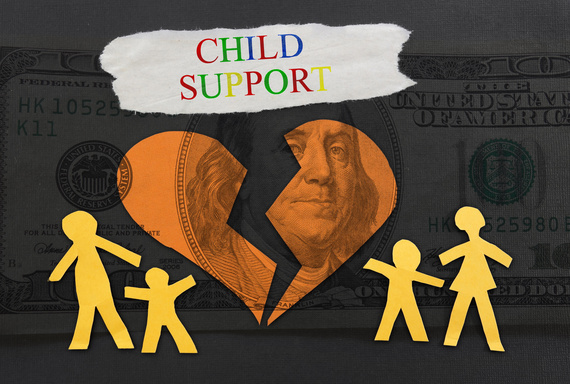Brick Layer
VIP Member
TO ALL SUNDRY BY THESE PRESENTS,
I am a divorced Michigan father of three boys (now adults) who have experienced Parental Alienation after I was abandoned by my ex spouse and her taking my children along for the ride her. The children and I have suffered untold damage at the hands of the Federal Title IV-D Program and the duty of care administered at the state and local county level. I am creating this thread to bring awareness and education for discussion to this 'Title IV-D Program' topic in hopes of keeping families together, bring families together, and so that children may be raise by both parent (if not together at least equal time) - AFTER MATH.
I offer this personal information as my first attempt at starting this thread was censored and deleted.
Reason: You must have some content of your own with every OP."
I am guessing OP means opening post? Anyway life is good and it is an honor to bring you this thread....
Please stay on topic (education and awareness) Title IV-D discussion for practical application. My point of this thread is not to hash out family matters; or solve anyone's legal wows-child support or otherwise; nothing here is to be considered legal advice.
Kindest regards,
Brick Layer
_____________________________________
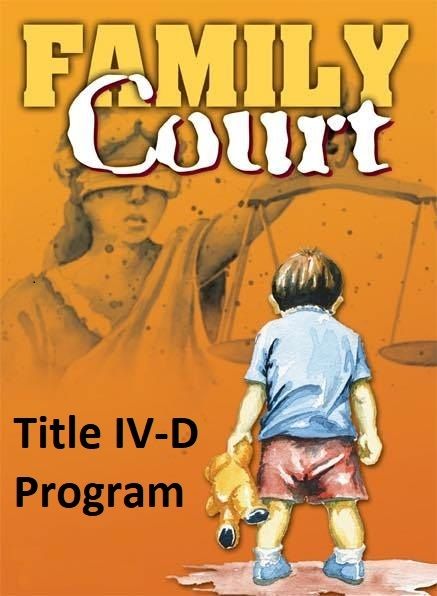
Hihil tam proprium imperio quam legibus vivere.
Nothing is so becoming to authority as to live according to the law.
CONGRESSIONAL INTENT
The federal Child Support Enforcement program in Title IV-D of the Social Security Act was created as a program designed to recover taxpayer money spent on several federal welfare programs.
1910: The Uniform Desertion and Non-Support Act made it a crime to willfully abandon or neglect to provide support for children under the age of 16.
The History of Child Support in the U.S.
1950: Social Security Act Amendments which added 402(a)(11) to the Act, 42 U.S.C. 602(a)(11), requiring state AFDC agencies to notify appropriate law enforcement officials when a child received AFDC because of abandonment or desertion by a parent. The intent was that these parents be held responsible for the support of their minor children, not thrusting that cost upon the government and, ultimately, the taxpayer.
SupportGuidelines.com | Article: Child Support Enforcement in the United States and the Role of the Private Bar
The intent of federal IV-D legislation is supposed to be to recoup taxpayer money already spent on providing these welfare services to children who have been willfully abandoned by a parent [or parents] and left to rely on the government to self-sustain.
http://achildsright.typepad.com/followthemoney.pdf
http://www.familieslink.co.uk/download/jan07/The Money flow USA.pdf
1975: THE CREATION OF THE GOVERNMENT CHILD SUPPORT ENFORCEMENT PROGRAM
Injecting the Federal Government into domestic relations; President Ford signed the Social Service Amendments of 1974. The measure gave SSA the responsibility to locate deserting parents of their children.
Social Security History
The CSE program was passed by Congress in 1975 (P.L. 93-647) with two primary goals. The first goal was to reduce public expenditures for actual and potential welfare recipients by obtaining ongoing support from noncustodial parents. The second goal was to establish paternity for children born outside marriage so that child support could be obtained. The December 1974 Finance Committee report on the CSE legislation stated, “The problem of welfare in the United States is, to a considerable extent, a problem of the non-support of children by their absent parents” (U.S. Congress, Senate Committee on Finance, Social Services Amendments of 1974, report to accompany H.R. 17045, 93rd Cong. 2nd sess., S.Rept. 93-1356, p. 42). It also stated that the result of a new federal-state CSE program would be to lower welfare costs to the taxpayer and to deter fathers from abandoning their families. Both welfare and nonwelfare families are eligible for CSE services.
https://greenbook-waysandmeans.hous...house.gov/files/2012/documents/RL33422_gb.pdf
On January 4, 1975, President Gerald Ford signed into law the Social Security Amendments of 1974, which, among its other provisions, created a state-federal child support enforcement program under a new part D of title IV of the Social Security Act. This is now generally referred to as the "IV-D program." The purpose of this new partnership between the states and the federal government was directly tied to the existing federal program of cash assistance, or "welfare," under the Title IV-A, "Assistance to Families with Dependent Children" (AFDC). Specifically, the new IV-D program was designed to accomplish two welfare system-related goals through the enforcement of child support: (1) recover for state and federal governments the costs of public assistance paid out to families ("cost recovery"); and (2) help families on welfare leave the public assistance rolls and help families not yet on welfare avoid having to turn to public assistance ("cost avoidance"). Because the intent of Congress was that the IV-D program [establish paternity and] reduce expenditures for public assistance; in order to limit the growth of the public assistance rolls, Congress made IV-D services available to families not on AFDC. These non-public assistance families could voluntarily apply for IV-D services; they could, also, close their IV-D cases at any time.
INDUSTRY REPORTS: Child Support Enforcement in the United States and the Role of the Private Bar « Child Support Enforcement Council http://www.csecouncil.org/pdf/role_of_bar.pdf
The Child Support Enforcement (CSE) program was enacted in 1975 as a federal-state program (Title IV-D of the Social Security Act) to (1) reduce public expenditures for welfare recipients by obtaining ongoing support from noncustodial parents that could reimburse the state and federal governments for part of their expenses (i.e., welfare cost-recovery) and (2) [Cost-avoidance]… . While welfare cost-recovery still remains an important function of the program, its other aspects include service delivery and promotion of self-sufficiency and parental responsibility. The CSE program has different rules for welfare and non-welfare families.
https://www.ncsea.org/documents/CRS-Report-on-CSE-Program-Basics-5-2014.pdf
Child Support Enforcement is a welfare service for needy children (by definition ) which is regulated by Title IV-D of the Social Security Act. According to the law, Federal Title IV-D dollars can only be spent on Title IV-D services. Title IV-D services include all child support services provided in Michigan with the exception of custody and parenting time [those services are paid for with State and local dollars]. A case qualifies for Title IV-D services when children are receiving public assistance or a custodial party or non-custodial parent has requested Title IV-D services.
Needy by definition:
the “Assignment” of debt under 408 (a)(3) of the Social Security Act should ONLY be valid if the child is receiving or has received public assistance; the key is section 301.1 of the definitions in title 45 CFR. Title 45 Section 302 says all child support recovery assignments in which the custodial parent receive TANF comes from a assignment from 301.1, which states the assignment came from 408 (a)(3) when the family receives assistance. Prohibitions; Requirements (A) General.— “…not exceeding the total amount of assistance so provided to the family, which accrue (or have accrued) before the date the family ceases to receive assistance under the program, which assignment, on and after such date, shall not apply with respect to any support (other than support collected pursuant to section) which accrued before the family received such assistance and which the State has not collected.”
Social Security Act §408
45 CFR Part 302 - STATE PLAN REQUIREMENTS
45 CFR 301.1 - General definitions.
Child support payments enable parents who do not live with their children to fulfill their financial responsibility to their children by contributing to the payment of childrearing costs; and paternity establishment is a prerequisite for obtaining a child support order, federal law requires an affidavit to be completed by men voluntarily [Section 466(a)(5)(D) of the Social Security Act (42 U.S.C. § 666(a)(5)(D)) stipulates that an unmarried woman cannot put a man’s name on a child’s birth record/certificate unless the man has voluntarily acknowledged that he is the father of that child…] acknowledging paternity and entitles the affidavit to full faith and credit in any state. A written stipulation of the parents 'parties litigant' is required in the record before orders can be valid; in Michigan for a Friend of The Court case, the parties must enter into a written agreement that is reviewed and entered in the record by the court. In a free society, if there is no welfare in your specific case then Title IV-D Child Support Services are voluntary and requires a stipulation.
Ejus est nolle, qui potest velle.
A person who can will (exercise volition) has a right to refuse to will (withhold consent).
A stipulation is a statement of agreement or admission of factual information, an agreement made by parties or by their attorneys in a judicial proceeding before the court. Stipulations are entered into the record to assist the court in establishing facts “not in dispute.” Stipulations are only binding between the parties that made the agreement, not on third parties.
Consensus facit legem.
Consent makes law. • A contract constitutes law between the parties agreeing to be bound by it.
The 'PUBLIC INTEREST' does not solely lie with assuring children receive support in so much as the Title IV-D Child Support Program is a two part facet:
(1) WILLFUL ABANDONMENT OR DESERTION, and;
(2) SUPPORT, along the way of WELFARE and or INFORMED CONSENT.
Brick Layer
Please do not post a thread title in all caps. Also please read the Rules. Post a snip/link/and comment only. Yours is entirely too long. Thanks.
I am a divorced Michigan father of three boys (now adults) who have experienced Parental Alienation after I was abandoned by my ex spouse and her taking my children along for the ride her. The children and I have suffered untold damage at the hands of the Federal Title IV-D Program and the duty of care administered at the state and local county level. I am creating this thread to bring awareness and education for discussion to this 'Title IV-D Program' topic in hopes of keeping families together, bring families together, and so that children may be raise by both parent (if not together at least equal time) - AFTER MATH.
I offer this personal information as my first attempt at starting this thread was censored and deleted.
Reason: You must have some content of your own with every OP."
I am guessing OP means opening post? Anyway life is good and it is an honor to bring you this thread....
Please stay on topic (education and awareness) Title IV-D discussion for practical application. My point of this thread is not to hash out family matters; or solve anyone's legal wows-child support or otherwise; nothing here is to be considered legal advice.
Kindest regards,
Brick Layer
_____________________________________
Hihil tam proprium imperio quam legibus vivere.
Nothing is so becoming to authority as to live according to the law.
CONGRESSIONAL INTENT
The federal Child Support Enforcement program in Title IV-D of the Social Security Act was created as a program designed to recover taxpayer money spent on several federal welfare programs.
1910: The Uniform Desertion and Non-Support Act made it a crime to willfully abandon or neglect to provide support for children under the age of 16.
The History of Child Support in the U.S.
1950: Social Security Act Amendments which added 402(a)(11) to the Act, 42 U.S.C. 602(a)(11), requiring state AFDC agencies to notify appropriate law enforcement officials when a child received AFDC because of abandonment or desertion by a parent. The intent was that these parents be held responsible for the support of their minor children, not thrusting that cost upon the government and, ultimately, the taxpayer.
SupportGuidelines.com | Article: Child Support Enforcement in the United States and the Role of the Private Bar
The intent of federal IV-D legislation is supposed to be to recoup taxpayer money already spent on providing these welfare services to children who have been willfully abandoned by a parent [or parents] and left to rely on the government to self-sustain.
http://achildsright.typepad.com/followthemoney.pdf
http://www.familieslink.co.uk/download/jan07/The Money flow USA.pdf
1975: THE CREATION OF THE GOVERNMENT CHILD SUPPORT ENFORCEMENT PROGRAM
Injecting the Federal Government into domestic relations; President Ford signed the Social Service Amendments of 1974. The measure gave SSA the responsibility to locate deserting parents of their children.
Social Security History
The CSE program was passed by Congress in 1975 (P.L. 93-647) with two primary goals. The first goal was to reduce public expenditures for actual and potential welfare recipients by obtaining ongoing support from noncustodial parents. The second goal was to establish paternity for children born outside marriage so that child support could be obtained. The December 1974 Finance Committee report on the CSE legislation stated, “The problem of welfare in the United States is, to a considerable extent, a problem of the non-support of children by their absent parents” (U.S. Congress, Senate Committee on Finance, Social Services Amendments of 1974, report to accompany H.R. 17045, 93rd Cong. 2nd sess., S.Rept. 93-1356, p. 42). It also stated that the result of a new federal-state CSE program would be to lower welfare costs to the taxpayer and to deter fathers from abandoning their families. Both welfare and nonwelfare families are eligible for CSE services.
https://greenbook-waysandmeans.hous...house.gov/files/2012/documents/RL33422_gb.pdf
On January 4, 1975, President Gerald Ford signed into law the Social Security Amendments of 1974, which, among its other provisions, created a state-federal child support enforcement program under a new part D of title IV of the Social Security Act. This is now generally referred to as the "IV-D program." The purpose of this new partnership between the states and the federal government was directly tied to the existing federal program of cash assistance, or "welfare," under the Title IV-A, "Assistance to Families with Dependent Children" (AFDC). Specifically, the new IV-D program was designed to accomplish two welfare system-related goals through the enforcement of child support: (1) recover for state and federal governments the costs of public assistance paid out to families ("cost recovery"); and (2) help families on welfare leave the public assistance rolls and help families not yet on welfare avoid having to turn to public assistance ("cost avoidance"). Because the intent of Congress was that the IV-D program [establish paternity and] reduce expenditures for public assistance; in order to limit the growth of the public assistance rolls, Congress made IV-D services available to families not on AFDC. These non-public assistance families could voluntarily apply for IV-D services; they could, also, close their IV-D cases at any time.
INDUSTRY REPORTS: Child Support Enforcement in the United States and the Role of the Private Bar « Child Support Enforcement Council http://www.csecouncil.org/pdf/role_of_bar.pdf
The Child Support Enforcement (CSE) program was enacted in 1975 as a federal-state program (Title IV-D of the Social Security Act) to (1) reduce public expenditures for welfare recipients by obtaining ongoing support from noncustodial parents that could reimburse the state and federal governments for part of their expenses (i.e., welfare cost-recovery) and (2) [Cost-avoidance]… . While welfare cost-recovery still remains an important function of the program, its other aspects include service delivery and promotion of self-sufficiency and parental responsibility. The CSE program has different rules for welfare and non-welfare families.
https://www.ncsea.org/documents/CRS-Report-on-CSE-Program-Basics-5-2014.pdf
Child Support Enforcement is a welfare service for needy children (by definition ) which is regulated by Title IV-D of the Social Security Act. According to the law, Federal Title IV-D dollars can only be spent on Title IV-D services. Title IV-D services include all child support services provided in Michigan with the exception of custody and parenting time [those services are paid for with State and local dollars]. A case qualifies for Title IV-D services when children are receiving public assistance or a custodial party or non-custodial parent has requested Title IV-D services.
Needy by definition:
the “Assignment” of debt under 408 (a)(3) of the Social Security Act should ONLY be valid if the child is receiving or has received public assistance; the key is section 301.1 of the definitions in title 45 CFR. Title 45 Section 302 says all child support recovery assignments in which the custodial parent receive TANF comes from a assignment from 301.1, which states the assignment came from 408 (a)(3) when the family receives assistance. Prohibitions; Requirements (A) General.— “…not exceeding the total amount of assistance so provided to the family, which accrue (or have accrued) before the date the family ceases to receive assistance under the program, which assignment, on and after such date, shall not apply with respect to any support (other than support collected pursuant to section) which accrued before the family received such assistance and which the State has not collected.”
Social Security Act §408
45 CFR Part 302 - STATE PLAN REQUIREMENTS
45 CFR 301.1 - General definitions.
Child support payments enable parents who do not live with their children to fulfill their financial responsibility to their children by contributing to the payment of childrearing costs; and paternity establishment is a prerequisite for obtaining a child support order, federal law requires an affidavit to be completed by men voluntarily [Section 466(a)(5)(D) of the Social Security Act (42 U.S.C. § 666(a)(5)(D)) stipulates that an unmarried woman cannot put a man’s name on a child’s birth record/certificate unless the man has voluntarily acknowledged that he is the father of that child…] acknowledging paternity and entitles the affidavit to full faith and credit in any state. A written stipulation of the parents 'parties litigant' is required in the record before orders can be valid; in Michigan for a Friend of The Court case, the parties must enter into a written agreement that is reviewed and entered in the record by the court. In a free society, if there is no welfare in your specific case then Title IV-D Child Support Services are voluntary and requires a stipulation.
Ejus est nolle, qui potest velle.
A person who can will (exercise volition) has a right to refuse to will (withhold consent).
A stipulation is a statement of agreement or admission of factual information, an agreement made by parties or by their attorneys in a judicial proceeding before the court. Stipulations are entered into the record to assist the court in establishing facts “not in dispute.” Stipulations are only binding between the parties that made the agreement, not on third parties.
Consensus facit legem.
Consent makes law. • A contract constitutes law between the parties agreeing to be bound by it.
The 'PUBLIC INTEREST' does not solely lie with assuring children receive support in so much as the Title IV-D Child Support Program is a two part facet:
(1) WILLFUL ABANDONMENT OR DESERTION, and;
(2) SUPPORT, along the way of WELFARE and or INFORMED CONSENT.
Brick Layer
Please do not post a thread title in all caps. Also please read the Rules. Post a snip/link/and comment only. Yours is entirely too long. Thanks.
Attachments
Last edited by a moderator:

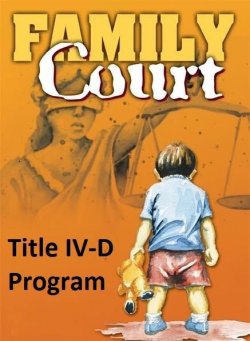
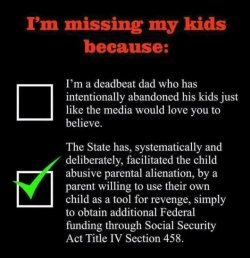


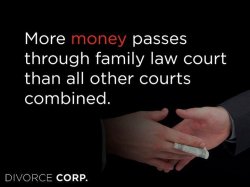
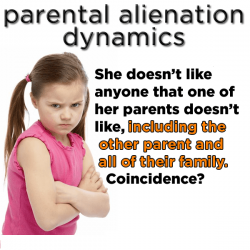

 'written agreement', so ordered enforced!
'written agreement', so ordered enforced!
